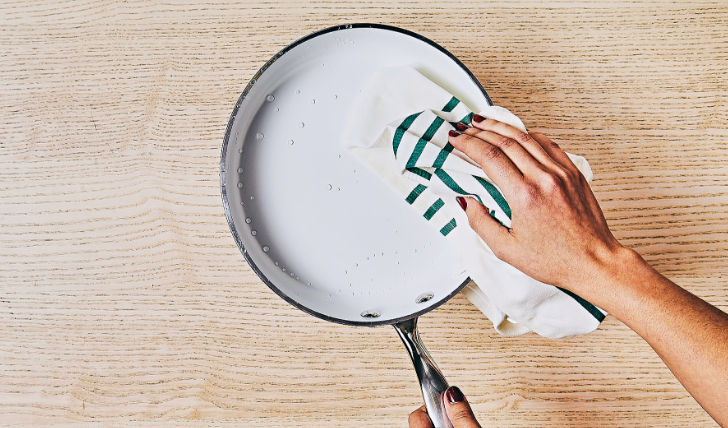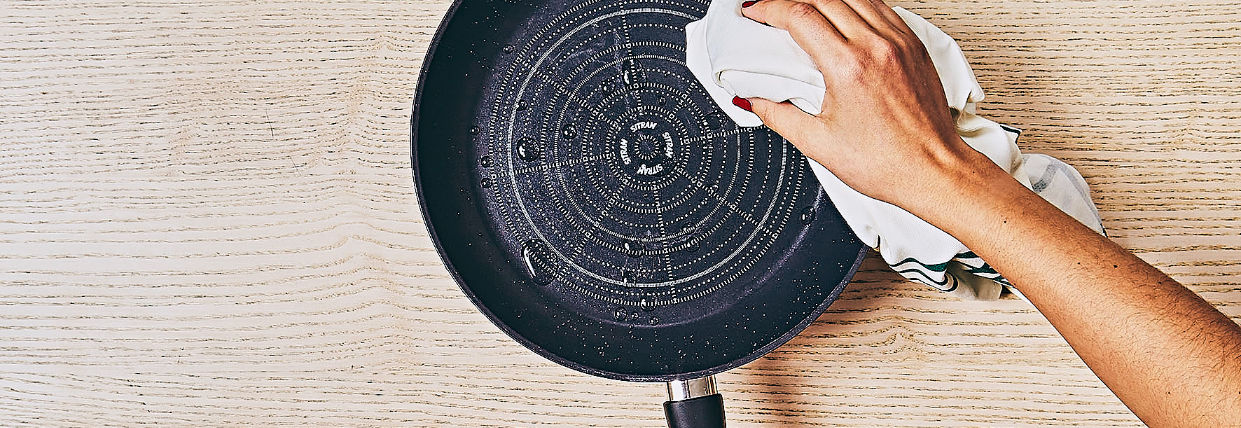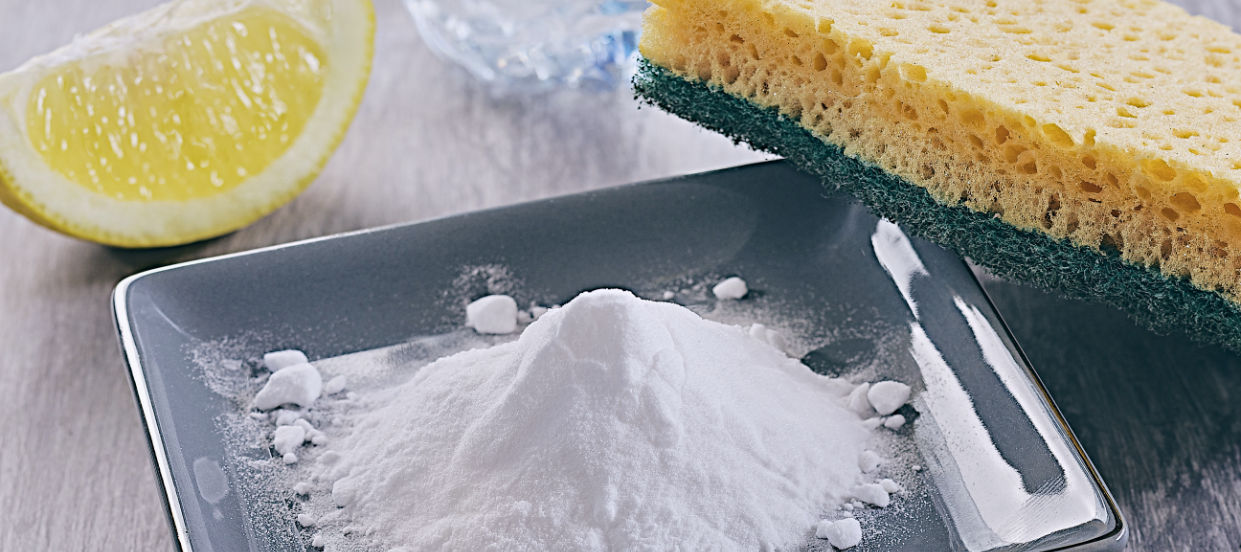
HOW TO CLEAN AND TAKE CARE OF YOUR COOKWARE
With the right cleaning and maintenance products, you can enjoy your cookware for many years to come. Proper maintenance ensures your pots, pans, and other cookware last for as long as possible. Sometimes, simple dishwashing liquid and water suffice.
Other times, you'll need special products to remove residues, burn marks, and grease. So how do you clean and maintain your cookware? Which products and materials are safe for your saucepans and frying pans? And how do you tackle the toughest stains?
Precautions for ensuring the
longevity of your cookware
Cast iron Dutch ovens, pressure cookers, couscous pots, stainless steel and aluminum saucepans and frying pans, with or without coating...There are lots of different types of cookware, and each comes with its own care instructions.
Before the first use
Before using your new cookware for the first time, always take the time to wash it. To do so, simply clean the cookware with hot water, a soft sponge, and some dishwashing liquid.
After washing, rinse and dry the cookware thoroughly. If the cookware has a coating, add a little oil to the inside. Always remove excess oil with paper towel.

Everyday upkeep
Here are some tips and precautions to ensure your cookware lasts as long as possible:

Which products are best for your
cookware?
You can use the following products on your cast iron Dutch ovens, saucepans and pots, frying pans, pressure cookers, and special cookware (couscous pot, steamer, etc.):
How do you clean your Dutch ovens,
saucepans, and frying pans?
The instructions above apply to all types of cookware. However, special precautions must be taken for certain production materials and coatings. Let's discover how to care for this cookware.

Cookware with non-stick coatings
Coated cookware is easier to clean. Non-stick coatings prevent food from sticking and forming residues that are difficult to remove. In most cases, this cookware can be cleaned with a soft sponge and some hot soapy water.
For more stubborn grease and residue, let the cookware soak for around 10 minutes in hot water. This will make it easier to remove the residues.
Please note: Never use a metal pad or an abrasive sponge to clean your coated cookware as these products can damage the coating.
If you stack your cookware, think of inserting a felt cloth or a sheet of paper towel between each piece. This will prevent friction and scratches and help your cookware last longer.
Stainless steel cookware
Cookware made of 100% stainless steel is perfect for cooking food in its juices. However, this type of cookware is a little harder to clean (but not unreasonably so). To remove stubborn grease stains and residue from the bottom, simply soak the cookware in hot soapy water (with dishwashing liquid) for around 10 minutes. The stains and residue then come off easily with a wooden spoon, a dish brush, or a sponge. Never use an iron wool pad on stainless steel cookware. Instead, use a stainless steel wool pad (but only if you've tried everything else). You should also avoid using overly aggressive products and abrasive sponges.
Stains sometimes appear on stainless steel cookware. Here are some products to help you remove them:
Other cookware
Here are some tips for cleaning your aluminum, cast iron, or steel cookware:
Advanced cleaning tips
Among other things, discover how to clean stubborn residues and burnt bottoms.
How do you clean a burnt saucepan or
frying pan?
Who hasn't forgotten about a pan on the stove? If your cookware overheats, never remove it immediately. Turn off the cooktop, cover the cookware with a wet cloth (if necessary), and wait until it cools down completely.
To remove burnt and encrusted marks from the bottom of stainless steel cookware, fill your sink with water, add a dishwasher tablet, and let the cookware soak for one hour. The stains should then come off with a soft sponge. For certain stains (e.g., iridescent stains), you can also use a gently abrasive product (such as a soft scouring cream or clay) with some oil and vinegar or lemon juice.
To remove burn marks and stains from your enameled cast iron Dutch oven, pour some highly diluted bleach inside and let soak for a few hours before rinsing.
Finally, you can clean the base of a saucepan or frying pan by scrubbing vigorously with a stainless steel wool pad. This technique is extremely effective and will not damage the base of your cookware.
Regardless of the method, be sure to thoroughly rinse your cookware with water before using it again.
Can I use organic products to clean my cookware?
Certain organic products are also effective at removing stubborn stains from cookware. Here are some tips for cleaning a burnt saucepan or frying pan:

If your cookware is extremely damaged (warped body or depleted coating), it will no longer be able to cook like before. That means it's time to replace it! But before you throw away and replace your saucepan or frying pan, find out how to recycle it.
Recycling promos, customer loyalty...Sitram regularly participates in special operations with retail chains. Stay tuned to get your new cookware at the best price!
